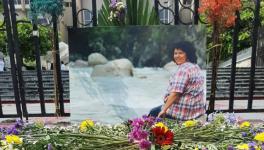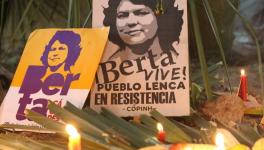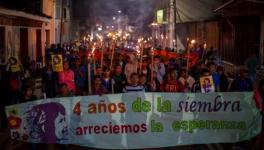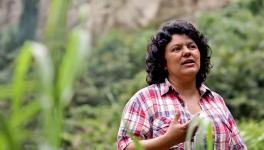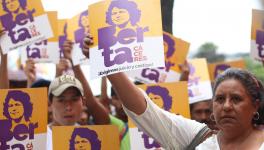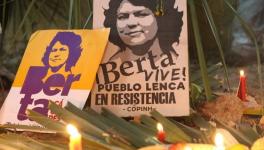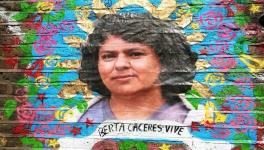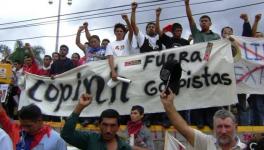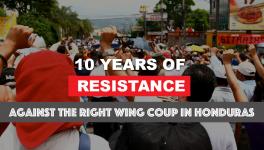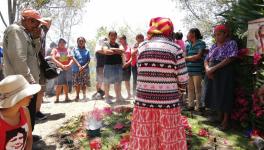The Radical Legacy of Berta Cáceres
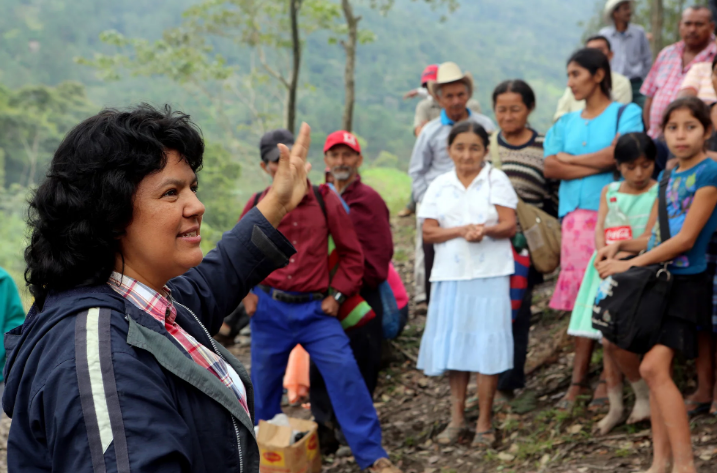
Photo: Goldman Environmental Prize
“Berta didn’t die, she multiplied!” Three years after the brutal and cowardly assassination of Berta Cáceres at her home in Honduras, these words are much more than a slogan. They capture the essence of the struggle of Berta, a struggle that cannot be extinguished or silenced with bullets, because what it seeks is to empower those who have historically been silenced. Berta’s struggle lives on, not only in her own organization, the Civic Council of Popular and Indigenous Organizations of Honduras (COPINH) which today is led by young, indigenous Lenca women, but across the world.
Berta co-founded COPINH in 1993 along with other comrades who felt that in the revolutionary movements of the 1980s in their region, Central America, the struggle of the indigenous people and the battles against patriarchy were not taken into account sufficiently. In Honduras, there was almost no official recognition of the indigenous and afro-descendent people, who today comprise just around 1 million members of the population (the exact numbers are difficult to find especially due to the same historic process of denial and invisibility of these populations). COPINH worked arduously, along with other organizations, to raise consciousness of the existence and resistance of the indigenous and afro-descendent Garifuna populations who were on the frontlines of the battles against neoliberal, extractivist, militaristic, racist, sexist onslaught in the 1990s.
One of their early achievements was forcing Honduras to ratify the International Labor Organization Convention 169 in 1995 which states that there must be a free, prior and informed consultation of the indigenous or ethnic communities if the state wishes to pursue an extractive project in their territory. This same convention has been the legal pillar of COPINH’s current struggle against the Agua Zarca hydroelectric project. In 1994, as a result of COPINH’s organizing, the first indigenous municipality was founded in the department of Intibucá, San Francisco de Opalaca.
COPINH’s comprehensive perspective on colonialism and its persistent impact is also reflected in an action they led in 1998 to take down the Christopher Columbus statue in the plaza outside the National Congress in Tegucigalpa and replace it with a statue of Lempira, an indigenous Lenca leader who played a crucial part in the resistance to Spanish colonial rule.The Lempira statue stands to this day.
COPINH also took the anti-patriarchal struggle very seriously, and brought to life a feminism deeply rooted in indigenous organizing practices, far from the feminism talked about in sanitized universities by white North Americans and Europeans. Berta played a key role in the process. Honduras is a deeply patriarchal society and though it has a rich history of rebellion and struggle across many sectors, it was almost unheard of for women to be spokespeople, let alone leaders and strategizers. Berta transformed perspectives and paradigms, not only by raising her voice and taking an active role in the organization, but by making the struggle against patriarchy a cornerstone of the work of COPINH: conducting workshops about the impact of patriarchy and gender violence, organizing women’s tribunals within the organization itself, and encouraging full and comprehensive participation of women and girls in the political activities of the organization.
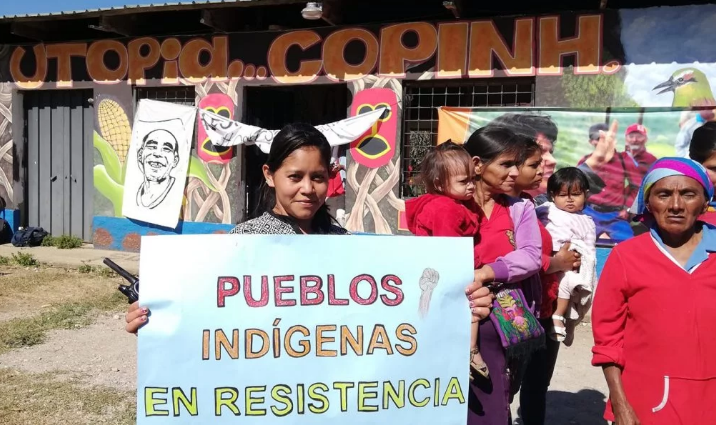
âIndigenous people in resistanceâ. Photo: COPINH
Though the work of COPINH was based in the territories of the Lenca indigenous people, Berta knew that the struggle of her people against capitalism, patriarchy, militarism and colonialism would only have an impact if it was linked to the territorial struggles of other communities in Honduras, the continent and in the world. Berta placed a lot of emphasis on the necessity of exchanging experiences and building relationships with other movements. COPINH holds combatant, working-class internationalism at its core, always showing their solidarity with movements across the world, participating in activities and platforms across Our America and defending the sovereignty of Cuba and Bolivarian Venezuela from US imperialism.
The internationalist commitment of Berta became clear in the hours after her assassination. Cries of indignation and anger were heard from across the world. Organizations, movements, collectives, platforms, and networks from all corners of the globe joined COPINH and Berta’s family in denouncing the act and demanding justice. The international and national solidarity, along with the determined struggle of her organization COPINH, has been the principal factor that has driven the legal proceedings in the Honduran courts, where, as in many countries in Latin America, the cases of assassinated social leaders rarely make it to trial.
In November, the first trial in the Berta Cáceres case concluded. Eight men suspected of participating first hand in the assassination, including security agents from the DESA company which held the Agua Zarca project concession, ex-military members, hit-men and the environmental engineer of the DESA company were tried. Seven of the eight men were convicted and sentenced (one man had no proven participation and COPINH had called for his release since his arrest in 2016). However, the legal process itself was characterized by irregularities and consistent attempts by the attorney general to obstruct the process of comprehensive justice sought by the victims, which recognizes the larger criminal structure involved in the assassination, specifically members of the Atala family, one of the most powerful families in Honduras.
COPINH and the Berta’s family members continue their calls for true justice. After the conclusion of the trial on November 29, 2018, they stated “The impunity that the masterminds of this crime continue to enjoy is part of the plot of corruption and violence that sustains the model of extraction that plunders our peoples. As victims, and other people, communities and organizations we commit to continue confronting it, like Berta Cáceres did, until dignity, truth and justice prevail in this case and in all of the struggles that are being waged right now throughout Honduras and the world.”
This weekend, COPINH is holding three days of activities to honor Berta and her struggle and renew the calls for justice.
“In our worldview, we are beings who come from the Earth, from the water, and from corn. The Lenca people are ancestral guardians of the rivers, in turn protected by the spirits of young girls, who teach us that giving our lives in various ways for the protection of the rivers is giving our lives for the well-being of humanity and of this planet… Let us wake up! We’re out of time. WE must shake our conscience free of the rapacious capitalism, racism and patriarchy that will only assure our own self-destruction.
“Our Mother Earth – militarized, fenced-in, poisoned, a place where basic rights are systematically violated – demands that we take action.”
-Berta Isabel Cáceres Flores
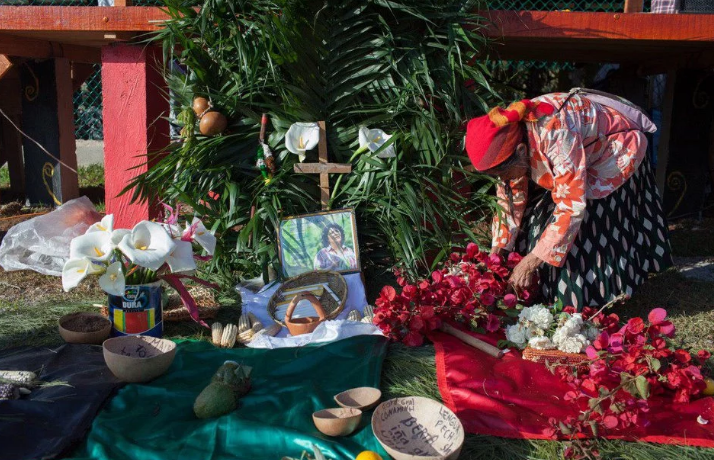
An altar to Berta Cáceres during COPINHâs activities last year. Photo: COPINH
Get the latest reports & analysis with people's perspective on Protests, movements & deep analytical videos, discussions of the current affairs in your Telegram app. Subscribe to NewsClick's Telegram channel & get Real-Time updates on stories, as they get published on our website.









